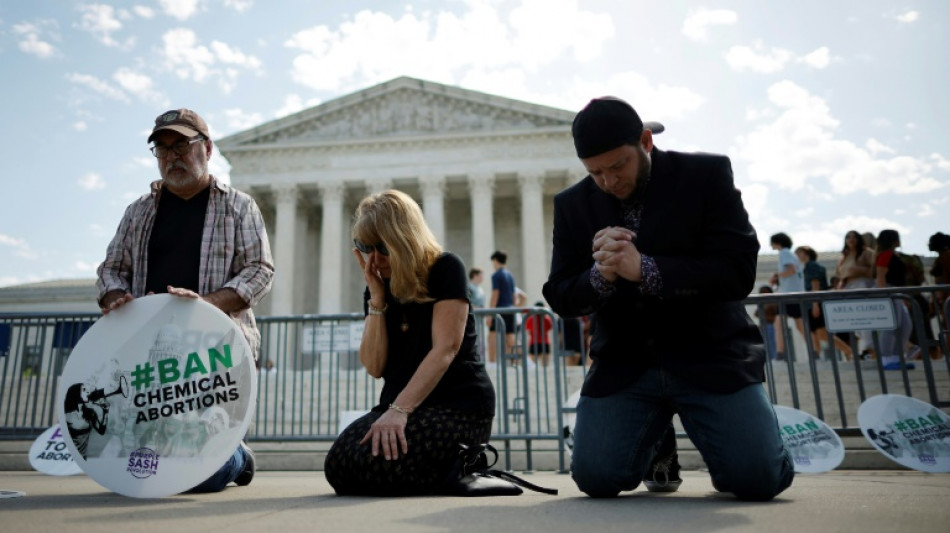
US Supreme Court preserves access to abortion pill -- for now

The US Supreme Court on Friday temporarily preserved access to a widely used abortion pill, freezing rulings by lower courts that would have banned or severely restricted availability of the drug.
Two conservative justices disagreed with the decision in the most significant abortion case to reach the nine-member court since it overturned the constitutional right to the procedure 10 months ago.
In delivering a one-paragraph decision, the court did not comment on the merits of the case brought by anti-abortion groups seeking a ban on the abortion drug, mifepristone.
But their order means that mifepristone, which accounts for more than half of the abortions in the United States, will remain available while the case plays out in an appeals court.
The Justice Department of President Joe Biden had filed an emergency appeal asking the Supreme Court to block the lower court rulings that would have banned or restricted access to mifepristone.
The case stems from a ruling by a US District Court judge in Texas, in a lawsuit brought by a coalition of anti-abortion groups, that would have banned mifepristone, which was approved by the Food and Drug Administration (FDA) in 2000.
An appeals court blocked a ban on the abortion pill, but imposed tough restrictions on access, after which the baton was handed to the Supreme Court, where conservatives wield a 6-3 majority.
The Supreme Court decision effectively freezes the lower court rulings pending an appellate court hearing of an appeal from the Justice Department and mifepristone manufacturer Danco Laboratories.
Arguments in the Louisiana-based US Fifth Circuit Court of Appeals have been scheduled for May 17 and any ruling by the appellate court is likely to eventually reach the Supreme Court.
Reacting to the Supreme Court move, Biden said the lower court decisions "would have undermined FDA's medical judgment and put women's health at risk."
"Mifepristone remains available and approved for safe and effective use while we continue this fight in the courts," Biden said in a statement. "I will continue to fight politically-driven attacks on women's health."
- 'Relieved' -
Abortion rights and civil liberties groups welcomed the Supreme Court decision but warned that the future of mifepristone remains in danger.
"We aren't out of the woods by any means," said Jennifer Dalven, director of the ACLU Reproductive Freedom Project.
"This case, which should have been laughed out of court from the very start, will continue on," Dalven said. "And as this baseless lawsuit shows, extremists will use every trick in the book to try to ban abortion nationwide."
"We are relieved that the Supreme Court has granted this full stay," Tammi Kromenaker, the director of an abortion clinic in Minnesota, told AFP. "This means that medication abortion can continue to be offered to patients who prefer this method for termination of pregnancy."
The anti-abortion group Alliance Defending Freedom noted the Supreme Court decision and said it will "look forward to a final outcome in this case that will hold the FDA accountable."
"The FDA must answer for the damage it has caused to the health of countless women and girls and the rule of law by failing to study how dangerous the chemical abortion drug regimen is," said Erik Baptist, senior counsel of the Alliance Defending Freedom.
Since the Supreme Court overturned the landmark Roe v. Wade ruling that enshrined the constitutional right to abortion for half a century, 13 states have banned abortion and it has been severely restricted in others.
The Justice Department has argued that the initial ruling banning mifepristone by the conservative federal judge in Texas, an appointee of former president Donald Trump, was based on a "deeply misguided assessment" of the pill's safety.
Mifepristone is one component of a two-drug regimen that can be used through the first 10 weeks of pregnancy.
Polls repeatedly show a clear majority of Americans support continued access to safe abortion, even as conservative groups push to limit the procedure -- or ban it outright.
(O.Tatarinov--DTZ)
